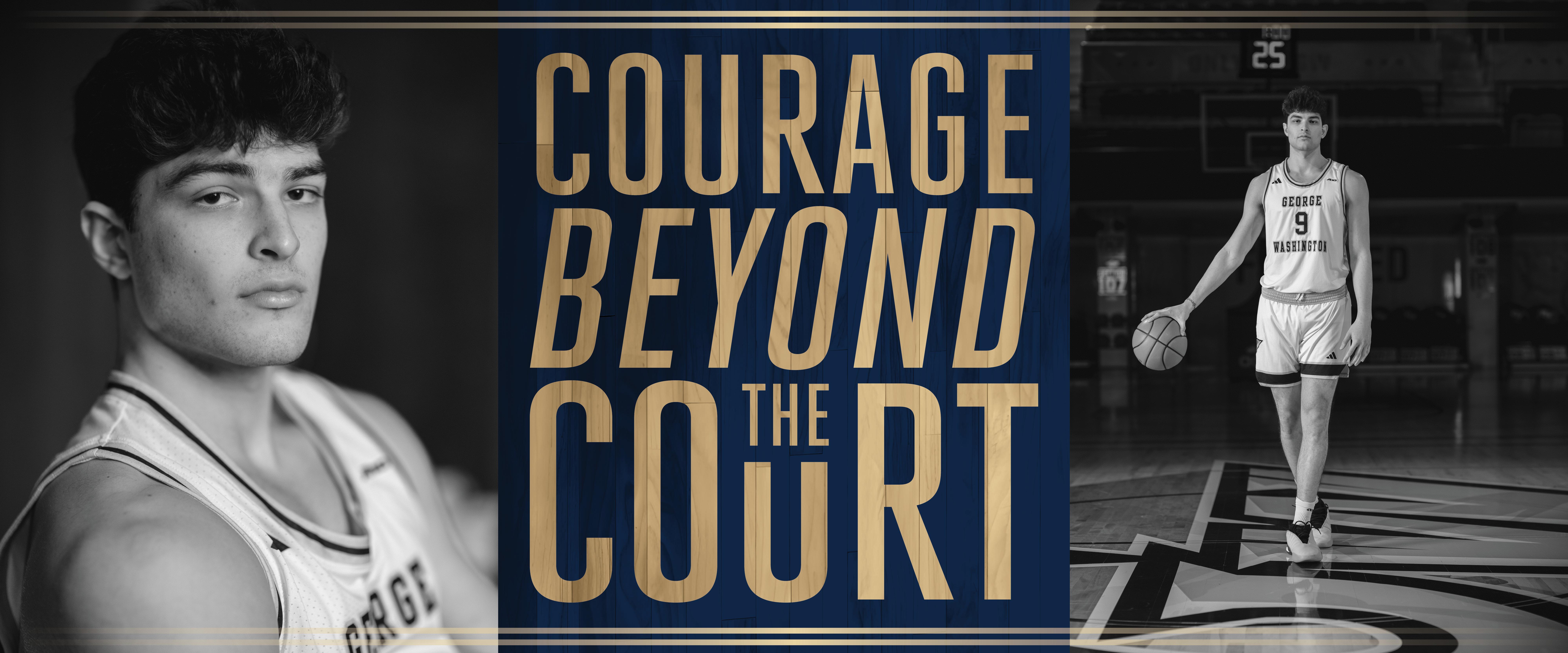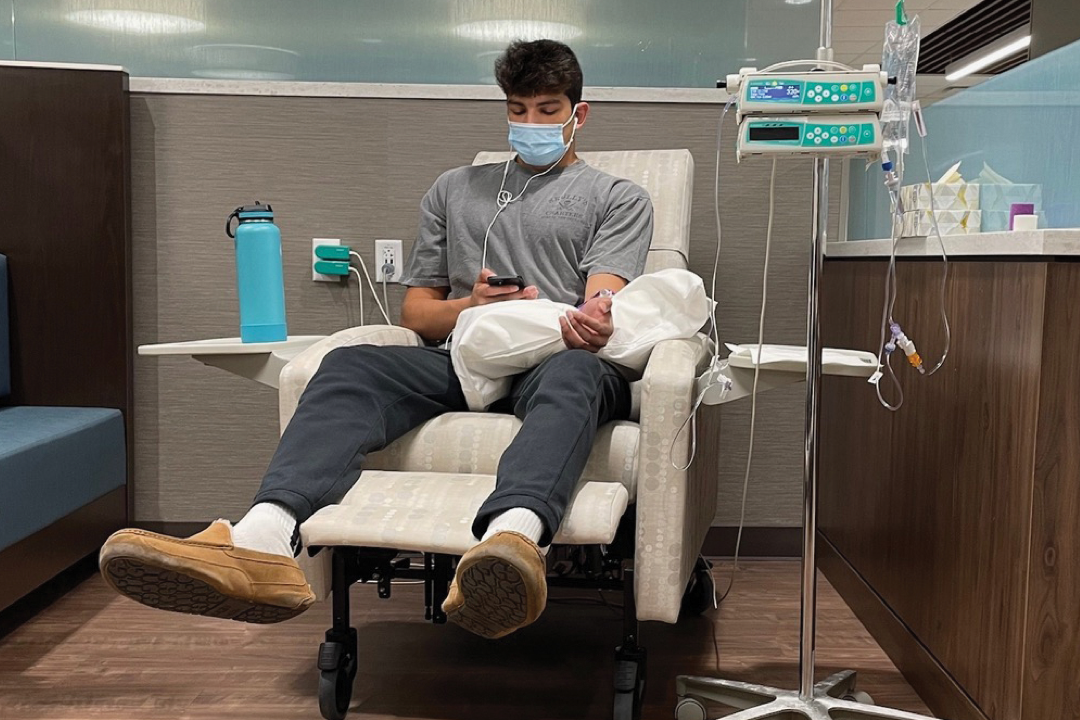Courage Beyond the Court
Garrett Johnson's journey from chemotherapy to college basketball
Story // Lisa Conley-Kendzior
Numbers often tell a story in the world of basketball—points scored, rebounds grabbed, games won. But for Garrett Johnson, a GW rising sophomore forward, the number on his jersey—nine—carries a narrative far beyond the confines of the court. It symbolizes not just a statistic but a journey of resilience, determination and, ultimately, triumph.
Johnson’s basketball career began like many others’: playing with a Little Tikes hoop and trying to emulate some of his favorite college players, like J.J. Redick.
But basketball was always more than just a game to the DMV native; it was a family affair, the catalyst for his parents’ relationship and a bond with his older brother, Braeden, who would later play college ball for Johns Hopkins University.
“I learned everything I know now from my older brother. Pretty much all my childhood memories are shooting in the driveway with him or playing one-on-one in the basement and crying to my mom that he was fouling me,” Johnson recalled with a smile.
Johnson’s parents, J.J. and Shubha, recognized their son’s extraordinary talent early on; after all, it’s not every day that a first-grader racks up 42 points in a single game.
“They both had a focus on the analytical side of basketball even at a young age,” Shubha Johnson said of Garrett and his older brother. “And that carried on; as he got older and got serious about it, [Garrett] looked at it more from the strategy, gameplay and analysis side as he was playing.”
“And he took every game seriously,” J.J. Johnson added. “If he did something wrong in the game, he brought it home with him, even as a nine-year-old.”
Johnson joined a travel basketball league, and by the time he enrolled at Episcopal High School in Alexandria, Va., he was already a star, scoring an average of 18.6 points per game and catching the eye of college scouts.
“Garrett was not only a scorer; he averaged six rebounds and almost two assists per game,” said Episcopal coach Jim Fitzpatrick. “His elite athleticism was on display when he would make plays above the rim on offense, and his strength and quickness were evident when he was asked to defend several different positions on the floor.”
As the coronavirus pandemic upended his senior season, Johnson maintained his skills through impromptu pickup games and an unofficial high school league held at The St. James fitness center in Northern Virginia. It was around that time that Johnson, who had already committed to Princeton University, noticed an unusual tightness in his hip.
Initially dismissing it as a stubborn muscle knot, Johnson sought relief from a chiropractor, who shared concerns that the young athlete’s condition might be something much more serious.
“The chiropractor worked on it and basically told us, ‘I don’t think this is a knot. Something more is going on here,’” Shubha Johnson recalled.
A subsequent MRI and CT scan revealed a rare desmoid tumor nestled in Johnson’s hip. The doctor called with the news on March 1, 2021—a day Johnson will never forget.
“In that moment, everything you’re thinking about changes in a second.”
“I just remember being in the kitchen when my mom got the call. In that moment, everything you’re thinking about changes in a second,” he said. “I went from being on top of the world to thinking am I going to live to see the next year?”
Although the tumor was benign, its aggressive nature required swift action.
Johnson embarked on a four-month chemotherapy pill regimen, but when it proved ineffective, his doctors recommended a procedure known as cryoablation.
The goal of the nine-hour operation was to freeze and destroy at least some–but hopefully all—of the tumor, which was too close to the sciatic nerve for a traditional removal.
“They told me, ‘If we hit something a little too far to the left or a little too far to the right, you might wake up and not be able to walk for a few years,’” Johnson recalled. “As a 19-year-old, that’s not something you ever think you’d have to worry about. It felt like the world was collapsing.”
The surgery ended up being the first in a series of four that would exact a heavy toll on the teen, both mentally and physically, eventually leading him to withdraw from Princeton to prioritize his health. But through it all, Johnson found solace in the familiar rhythm of the game he loved.
Johnson underwent nine rounds of chemotherapy.
“The only thing I knew was just to go work out, get shots up, lift. I would do two workouts every day, lift conditioning, and then get on the court and just do what I’d done my whole life,” he said. “My irrational belief or hope was that one day I was going to be able to play again and be normal.”
“There were a lot of time I’d go with him at night, and he would shoot for two hours and take 1,200 shots and just really work on his game,” J.J. Johnson said. “Mentally, that’s what kept him going.”
But in August 2022, a full year after Johnson’s initial cryoablation surgery, the tumor was as large as it had ever been. So the young basketball player began chemotherapy, traveling to and from Memorial Sloan Kettering Cancer Center in New York every few weeks for bloodwork and infusions.
“I kind of felt like I disappeared from the world a little bit,” he recalled. “Just sitting in my room every day thinking about what I should be doing, what all my peers and friends were doing…it was really tough mentally to go through that for two and a half years.”
The following spring, there were finally signs of progress; the tumor was shrinking, but moreover, Johnson was beginning to feel like his old self again, and he let himself dare to believe that maybe, just maybe, he’d be able to return to the court.
“I started to feel a lot of relief in my hip, in my leg and in my workouts,” he recalled, noting that he felt like he was returning to the level of mobility he had before the tumor.
Hopeful, Johnson entered the NCAA transfer portal and grabbed the attention of GW Men’s Basketball coach Chris Caputo, who invited the 6-foot-8 forward to showcase his skills for the coaching staff the morning after Johnson’s seventh transfusion.
The GW coaching staff wanted to understand the extent of Johnson’s health journey and evaluate if he could not only be a part of the team but also thrive as a college athlete. Watching Johnson work out post-chemotherapy, Caputo saw a young man who exhibited not just potential on the court but also resilience in the face of adversity.
“He looked healthy,” he said. “He had been through a lot to get to that point, but the more we got to know him, the more we wanted him here.”
Caputo offered Johnson a scholarship that same day. It was March 22, 2023—just over two years since his diagnosis.
“I was definitely very grateful for the opportunity,” Johnson said. “You feel confident in your abilities and that you’re going to get a chance to play somewhere, but to have the coaching staff’s trust after everything I went through was a testament to the work I did while I was out.”
Left: Garrett Johnson (front) hanging out with fellow rising sophomore forward Darren Buchanan Jr. (back).
Right: Johnson scored 21 points during his collegiate debut Nov. 6 against Stonehill.
“I know this could be taken away in a second and what that feels like, so I just remind myself, especially before every game, that
it’s a special opportunity that I’m able to do this.”
The decision to bring Johnson onto the team was coupled with a promise of patience. The coaching staff recognized that Johnson’s journey to recovery might not follow a linear path, and they were ready to support him however they could.
“We told him that we were trying to build a program over time that the university was going to be very proud of, and that wasn’t something that would happen overnight,” Caputo said. “So we would have some patience with him, and he should have some patience with himself.”
Johnson made his collegiate debut on Nov. 6, 2023, just months after his ninth and final round of chemotherapy. He scored 21 points, including five three-pointers, leading the GW Revolutionaries to a decisive 89-44 victory over the Stonehill Skyhawks.
“When he shot his first [three-pointer], I knew it was going in, and then he just kept going. I kept thinking yeah, he’s back,” said fellow rising sophomore forward Darren Buchanan Jr. “When we went into the locker room [after the game], I was like, ‘If we’re pouring water on anybody, it has to be Garrett Johnson,’ because to come back after two years and drop 21 points is remarkable.”
Johnson continued his explosive start to the season, averaging 13.4 points per game. But his success isn’t something he takes for granted, and his jersey number—nine, symbolizing the nine rounds of chemotherapy he endured—serves as a constant reminder of life’s fragility.
“I know this could be taken away in a second and what that feels like, so I just remind myself, especially before every game, that it’s a special opportunity that I’m able to do this,” he said. “It’s something to be thankful for.”
Beyond basketball, Johnson envisions using his experiences to help others facing adversity.
“I really want to be able to make an impact on people who feel the same feelings I felt when I was going through the roughest parts of it,” he said. “Whether it’s cancer or something else, I think there are a lot of people out there who feel like they’re alone, so if I can let them know that they have people in their corner, then that’s the best thing that I could do with my life.”
During training in preparation for the 2024-25 season, Garrett encountered another setback when he tore an ACL. He underwent successful surgery in late June and is expected to make a full recovery, but will be sidelined for the upcoming season.
Photography: William Atkins / Courtesy GW Athletics/ Courtesy Johnson Family





